- Home
- Clarice Lispector
Near to the Wild Heart Page 3
Near to the Wild Heart Read online
Page 3
She could offer him any thought and so create a new relationship between them. This is what pleased her most in her dealings with others. She was under no obligation to follow the past, and with a word she could invent a way of life. If she were to say: I'm three months pregnant, that's it! something would exist between them. Even though Otávio was not particularly stimulating. With him the most likely possibility was to link oneself to what had already taken place. Even so, beneath that gaze of his imploring 'save me, save me', she opened her hand from time to time and allowed a little bird to take sudden flight. But sometimes, perhaps because of the nature of what she said, no bridge was created between them. On the contrary, a gap opened up. 'Otávio — she suddenly said to him — has it ever occurred to you that a dot, a single dot without dimensions is the maximum of solitude? A dot cannot even rely on itself, from one moment to the next, it stands by itself.' As if she had thrown a red-hot coal at her husband, the phrase leaped from one side to the other, slipped from her hands until he rid himself of her with another phrase, cold as ashes, ashes to cover that interval: It's raining, I'm hungry, it's a fine day. Perhaps because she did not know how to play. But she loved him, for that way he had of gathering twigs.
She inhaled the clear, tepid air of evening, and that thing inside her, pleading for water, remained tense and rigid like someone waiting with eyes blindfolded for the shot to ring out.
Night came, and she continued to breathe with the same sterile rhythm. But as dawn gently lit up the bedroom, things emerged fresh from the shadows, she felt the new morning insinuating itself between the sheets and opened her eyes. She sat on the bed. Inside her it was as if there were no death, as if love could dissipate it, as if eternity meant renewal.
... The Aunt...
The journey took ages and from the distant woods came the pungent smell of damp scrub.
It was early morning and Joana had barely had time to wash her face. The housemaid at her side amused herself by reading out the advertisements on the tram. Joana was reclining with her right temple resting on the back of the seat and she permitted herself to be lulled by the consoling sound of the wheels, drowsily transmitted by the wood. The ground sped away beneath her lowered eyes, rapid, grey, lined with swift and fleeting stripes. Were she to open her eyes she would see each stone, she would dispel the mystery. But she half closed them and had the impression that the tram was going faster and that the fresh, salty, dawn breeze was growing stronger.
There was something odd about the cake she had eaten with her coffee, it was dark — tasted of wine and cockroaches — cake which they had persuaded her to eat with so much affection and pity that she hadn't had the heart to refuse. It now weighed heavily on her stomach and brought a sadness to her body which attached itself to that other sadness -. something immovable behind the curtain — with which she had slept and awoken.
— Tramping over this sand is hard work, the housemaid complained.
She crossed the stretch of sand which led to her aunt's house, heralding the beach. Beneath the grains of sand, there sprouted thin, dark grasses which wriggled vigorously to the smooth, white surface. A strong wind blew in from the invisible sea, bringing salt, sand, the languid sound of the waters, it entangled their skirts between their legs, furiously licking the girl's skin and that of the woman accompanying her.
— This is awful, the maid muttered between clenched teeth.
An even stronger gust lifted her skirt to her face, exposing her dark, muscular thighs. The coconut-palms writhed in desperation and the light, at once overcast and fierce, reflected itself on the beach and in the sky, without any trace of the sun so far. Dear God, what had happened to things? Everything was calling out: no! no!
Her aunt's house was a refuge where neither wind nor light penetrated. The woman sat down with a sigh in the sombre waiting-room, where, amidst the heavy, dark furniture, the smiling portraits of men in frames cast a gentle glow. Joana remained standing, scarcely inhaling that lukewarm odour which seemed sweet and musty after the sharp tang of the sea. The odour of mildew and tea sweetened with sugar.
The door leading into the house finally opened and her aunt, dressed in a house-coat with a bold floral pattern, rushed to embrace her. Before she could move in self-defence, Joana found herself being buried between those two mounds of soft, warm flesh which quivered with every sob. Trapped between those breasts and plunged into darkness, she could hear her aunt weeping as if through a pillow:
— My poor little orphan!
She could feel her face being drawn back from her aunt's bosom by those plump hands and for a second she was carefully scrutinized. Her aunt passed from one gesture to another without any transition, in quick abrupt stages. A fresh outburst of weeping exploded in her body and Joana received anguished kisses on her eyes, her mouth, her neck. Her aunt's tongue and mouth were soft and warm like those of a dog. Joana closed her eyes for an instant, swallowed the nausea and the dark cake which were heaving inside her stomach, causing her to shudder from head to foot. Her aunt pulled out a large, crumpled handkerchief and blew her nose. The housemaid remained seated, looking at the portraits, her legs sprawled out, her mouth wide open. The cleavage between the aunt's breasts was deep. She could have put her hand in there as if she were dipping into a bag and pulling out some surprise, an animal, a casket, whatever. Her breasts expanded with every sob, bulged out, and from the kitchen came the smell of beans cooked with garlic. Somewhere in the house, someone must be drinking great mouthfuls of olive oil. Those breasts could bury someone!
— Let me go! — Joana screamed, stamping her foot on the ground, her eyes dilated, her body trembling.
Her aunt leaned against the piano, stunned. The housemaid said: Leave her alone, she's tired. Joana was gasping for breath, her face a deathly white. She passed her darkened eyes over the room, felt she was being pursued. The walls were solid, she was trapped, trapped! A man in one of the portraits was watching her from behind his moustache and her aunt's breasts were in danger of spilling over her, melted into fat. She pushed the heavy door and fled.
A gust of wind and sand entered the hall, lifted the curtains, brought a breath of air. Through the open door, her handkerchief suppressing her sobs and her dismay — such a terrible disappointment — the aunt caught a fleeting glimpse of her niece's thin, bare legs scampering and scurrying between heaven and earth, until they disappeared in the direction of the beach.
Using the back of her hands, Joana wiped her face which was wet with kisses and tears. She breathed more deeply, still felt the insipid taste of that warm saliva, the cloying fragrance that came from her aunt's bosom. Unable to control her feelings any longer, anger and revulsion surfaced in violent waves and, leaning over a cavity in the rocks, she threw up, her eyes shut and tight, her body painful and vindictive.
The wind was now licking her with force. Pale and fragile, breathing gently, she could feel it salty and playful, pervading and penetrating her entire body, reviving her. She half opened her eyes. Down there below, the sea shone in waves of copper, stretched out, deep, opaque, serene. It came dense and rebellious, rising in spirals. Then it extended itself ... spreading itself over the peaceful sands like a living body. The sea — she said in a whisper, her voice hoarse.
She climbed down from the rocks, walked unsteadily along the solitary beach until she felt the water on her feet. Crouching down, her legs shaking, she drank a little sea-water. And there she lingered, resting. From time to time, she half closed her eyes, kept them level with the sea and she faltered, the vision was so sharp -just that long, green line, attaching her eyes to the water ad infinitum. The sun broke through the clouds and the glints of light that sparkled on the waters were tiny flares going in and out. The sea, beyond the waves, watched from afar, silent, without tears, without breasts. Mighty, mighty. Mighty, she smiled. And, suddenly, without any warning, she felt something powerful inside her, something strange which caused her to tremble a little. But it was neither cold nor sad, it was some mighty thing w
hich came from the sea, which came from the taste of salt in her mouth, and from her, from her herself. It was not sadness, but happiness close to horror... Every time she looked at the sea and its tranquil brilliance, she felt a sudden tightening then slackening throughout her body, around her waist and her bosom. She didn't really know if she should laugh for it was no laughing matter. On the contrary, oh, on the contrary, behind that thing lay the events of yesterday. She covered her face with her hands, almost ashamed, as she waited, feeling the heat of her laughter and her exhalation as it was sucked in once more. The water trickled over her feet which were now bare, gurgling between her toes, escaping as clear, as clear, as some transparent animal. Transparent and alive... She felt an urge to drink it, to bite it slowly. She caught it with cupped hands. The tiny quiescent lake glistened calmly in the sun, became warm, trickled away, escaped. The sand absorbed it quickly, quickly, went on absorbing it as if it had never experienced a trickle of water. She wet her face, passed her tongue over the empty, salty palm of her hand. The salt and the sun were like tiny, shining arrows which appeared here and there, stinging, stretching the skin of her wet face. Her happiness increased, gathered in her throat like a sack of air. But it was now a solemn happiness, with no desire for laughter. It was a happiness close to tears, dear God. Gradually, the thought occurred to her. Without fear, no longer grey and tearful, but naked and silent beneath the sun like the white sand. Daddy is dead. Daddy is dead. She breathed slowly. Now she really knew that Daddy had died. Now, beside the sea where the sparkling light was a shower of fishes made out of water. Her father had died just as the sea was deep. Suddenly she understood. She felt that her father had died just as one cannot see the bottom of the sea. She had not been defeated by her grief. She understood that her father had died. Nothing more. And her sadness was exhausting, heavy, without hatred. She carried that exhaustion with her as she walked along that endless beach. She looked at her dark, slender feet like twigs gathered from the quiescent whiteness where they sank and lifted rhythmically, as if breathing. She walked and walked and there was nothing to be done: her father had died.
She lay prostrate on the sand, her hands protecting her face, leaving only a tiny gap for air. It was starting to get dark, so dark, and little by little there emerged circles and red stains, round, quivering bubbles, growing and diminishing. The grains of sand pricked her skin, became embedded. Even with her eyes shut, she could sense that on the beach the waves were being sucked in rapidly, so rapidly, by the sea, the waves, too, with lowered eyelids. Then they gently returned, to the palms of her open hands, her body completely relaxed. It was consoling to hear that sound. I am a person. And many things were about to follow. What? Whatever might happen would depend on her. Even if no one should understand: she would think of something and then find herself unable to describe it accurately. Especially when it came to thinking, everything was impossible. For example, sometimes an idea occurred to her and, surprised, she would reflect: why didn't I think of this before? It wasn't the same thing as suddenly seeing a tiny gash in the table and saying: Now then, I didn't notice that before! It wasn't... A thing thought did not exist before being thought. Like this, for instance: Gustavo's fingerprints... What was being thought became something thought. Furthermore: not all things thought came into existence from that moment onwards... For if I say: Auntie is having lunch with Uncle, I don't bring anything to life. Or even if I decide I'm going for a stroll; that's fine, I go for a stroll... and nothing exists. But if I say, for example: flowers on the grave, there you have something which did not exist before I thought of flowers on a grave. It's the same with music. Why didn't she play on her own all the pieces of music that existed? — She looked at the open piano — all the pieces of music were stored inside there.. .Her eyes widened, grown dark and mysterious. 'Everything, everything.' That was when she began to tell lies. For she was a person who had already begun. All of this was impossible to explain, like that word 'never', neither masculine nor feminine. But even so, didn't she know when to say 'yes'? She knew. Oh, she knew more and more. For example, the sea. The sea was immense. Just to think of the sea made her want to sink into the sand, or to open her eyes wide, to stay there watching, but then she found there was nothing to watch. At her aunt's home, they would almost certainly spoil her with sweets during the first few days. She would bathe in the blue and white bathtub, once she was living in the house. And each night, when it turned dark, she would slip on her nightdress and go to bed. In the morning, coffee with milk and biscuits. Her aunt always baked large biscuits. But without salt. Like someone dressed in mourning watching from the tram. She would dip her biscuit into the sea before eating it. She would take a bite, then dash home to swallow a mouthful of coffee. And that is how she would go on. She would play in the yard, where there were sticks and bottles. But where, above all, there was that old chicken-coop without any chickens. The place smelled of lime and excrement and of things drying out. But she could sit in there, right down on the ground, looking at the soil. Soil formed from so many bits and pieces that it gave you a headache trying to guess just how many. The chicken-coop had netting and everything, and this would be her home. And there was still her uncle's farm which she scarcely knew, but where she would spend her holidays from now on. There were lots of nice things to look forward to, weren't there? She buried her face in her hands. Oh, such fear, such fear. But it wasn't only fear. It was like someone who has finished something and says: Please, Miss, I've finished. And the teacher says: Just sit there and wait for the others. And you sit there quietly as if you were in church. Inside a tall church and without saying a word. Those slender, fragile saints. When you touch them they feel cold. Cold and divine. And everything remains silent. Oh, such fear, such fear. However, it was not simply fear. I don't have anything to do and I don't know what to do. Like looking at something pretty, a fluffy chick, the sea, a lump in one's throat. But it wasn't only that. Open eyes blinking, and confused with the things behind the curtain.
Joana's Pleasures
The freedom she often experienced did not come from lucid reflections, but from a state that seemed to consist of perceptions, much too organic to be expressed in thoughts. Sometimes at the heart of that sensation there was the glimmering of an idea which made her vaguely aware of her species and colouring.
The state she slipped into when she murmured: eternity. The very thought acquired the nature of eternity. It deepened as if by magic and expanded, without any proper content or form, but also without dimensions. She had the impression that if she could manage to retain that sensation for a few more seconds she would experience a revelation — effortlessly, like seeing the rest of the world simply by leaning away from the earth and out into space. Eternity was not only time, but something akin to the deeply-rooted certainty of not being able to hold it in one's body because of death; the impossibility of suppressing eternity; just as an almost abstract feeling of absolute purity was eternal. But the clearest suggestion of eternity stemmed from the impossibility of knowing how many human beings would succeed her own body, which would one day distance itself from the present with the velocity of a shooting-star.
She defined eternity and explanations were inevitably born like the pulsations of the heart. She would not change a single word for they were her truth. They no sooner appeared, however, than they became devoid of any logic. To define eternity as a quantity greater than time and greater even than the time the human mind can sustain thought, would not permit her, even so, to perceive its duration. Its essential quality was not to have any quantity, not to be measurable and divisible because everything which could be measured and divided had a beginning and an end. Eternity was not that infinitely great quantity that exhausted itself; eternity was succession.
Then Joana suddenly understood that the greatest beauty was to be found in succession, that movement explained form — there was something so elevated and pure when one cried out: movement explains form! — and in succession one also discovered
sorrow because the body was much slower than the movement of uninterrupted continuity. Imagination captured and possessed the future of the present, while the body remained at the beginning of the road, living in another rhythm, blind to the experience of the spirit... Through these perceptions — by means of them, Joana made something exist — she connected with a happiness that was self-sufficient.
There were lots of pleasant sensations. To climb a mountain, to linger on the summit and, without looking round, to feel the presence of that conquered territory she had left behind, her uncle's farm way off in the distance. The wind catching her clothes, her hair. Her arms free, her heart closing and opening savagely, but her face bright and serene beneath the sun. And knowing, above all, that the earth beneath her feet was so deep and secret that there was no need to fear the invasion of understanding dissolving its mystery. This sensation had the hallmark of glory.
Certain moments of music. Music belonged to the same category as thought, both vibrated in the same movement and species. It possessed the same quality of a thought so intimate that upon hearing that music, the thought itself was revealed. A thought so intimate that upon hearing someone repeat the subtle nuances of those sounds, Joana found herself surprised, as if she had been invaded and dispersed. She no longer even heard the harmony once it was diffused — for then it was no longer hers. Or even when she listened to it a number of times, which destroyed the analogy: for her thought never repeated itself, while music could be played over and over again and sound exactly as before — thought was only equal to music creating itself. Joana did not identify herself closely with all the sounds. Only with those that were pure, and what she loved here was neither tragic nor comic.
There was also much to see. Certain moments of seeing were as valid as those 'flowers on a grave'. What one saw passed into existence. Joana, however, was not expecting some vision in a miracle announced by the Angel Gabriel. She was as astonished at what she had already perceived, suddenly seeing something for the first time, suddenly realizing that that something was constantly alive. Like a barking dog outlined against the sky. That was something apart that required no further explanation... An open door swinging to and fro, creaking in the evening silence... And suddenly, yes, there was the real thing. An old portrait of someone whom you don't know and are never likely to recognize because the portrait is old or because the person in the portrait has turned to ashes — this little distraction brought a moment of welcome respite. Also a mast without a flag, erect and mute, fixed into position on a summer's day — both the face and body blind. In order to have a vision, the thing did not have to be sad or happy or to manifest itself. It was enough to exist, preferably still and silent, in order to feel its mark. Dear God, the mark of existence... But this was not something to be pursued, since all that existed, perforce existed... The vision, in fact, consisted in surprising the symbol of things in the things themselves.

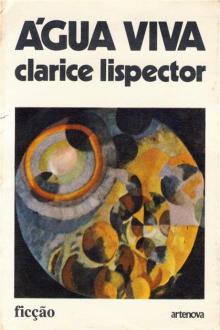 The Stream of Life
The Stream of Life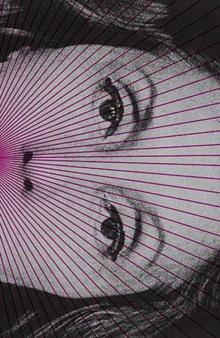 The Complete Stories
The Complete Stories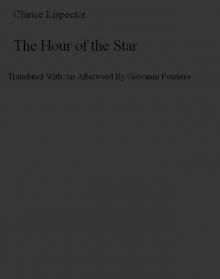 The Hour of the Star
The Hour of the Star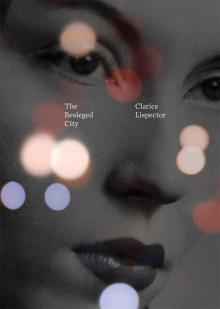 The Besieged City
The Besieged City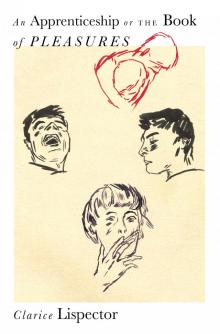 An Apprenticeship or the Book of Pleasures
An Apprenticeship or the Book of Pleasures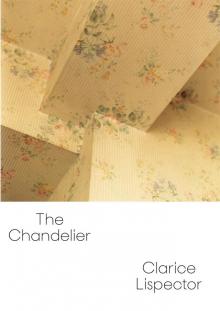 The Chandelier
The Chandelier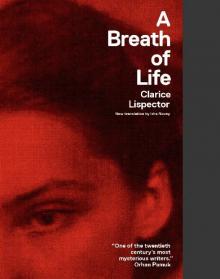 A Breath of Life
A Breath of Life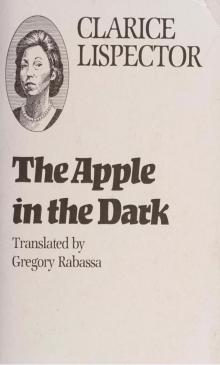 The Apple in the Dark
The Apple in the Dark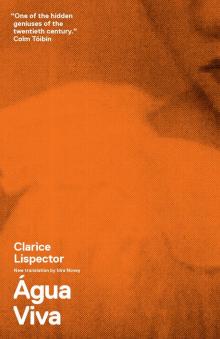 Agua Viva
Agua Viva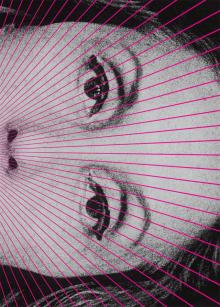 Complete Stories
Complete Stories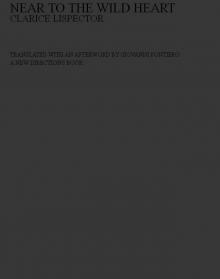 Near to the Wild Heart
Near to the Wild Heart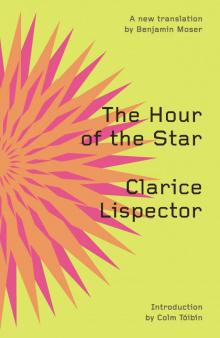 The Hour of the Star ()
The Hour of the Star ()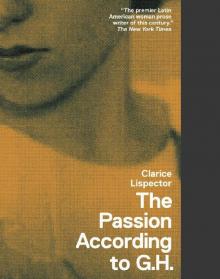 The Passion According to G.H.
The Passion According to G.H.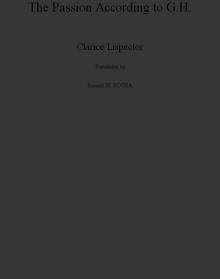 The Passion According to GH
The Passion According to GH